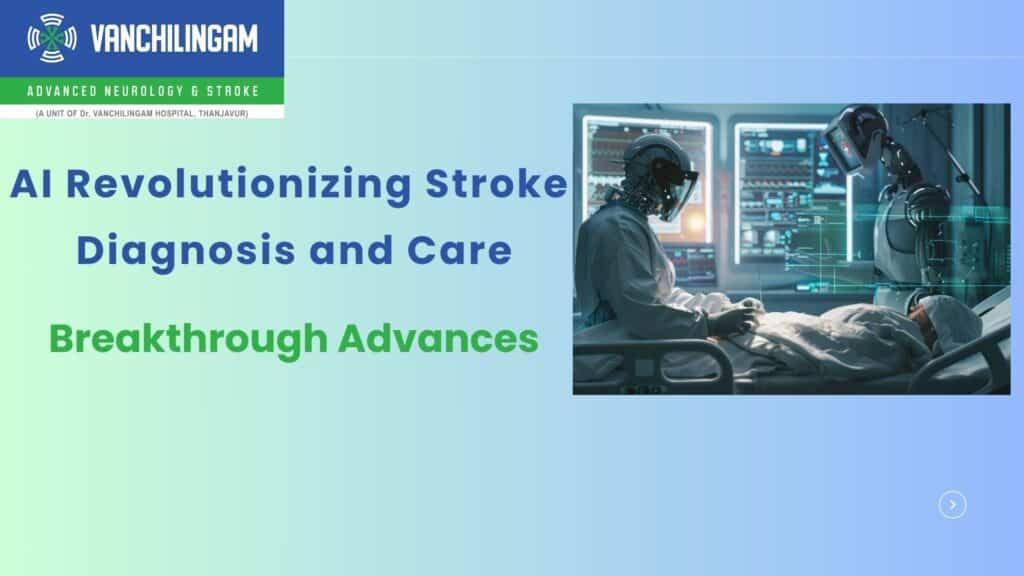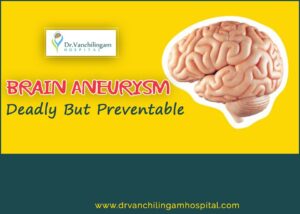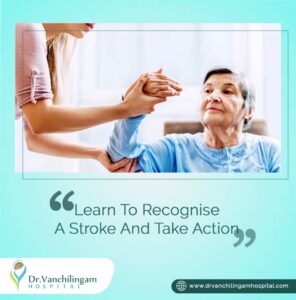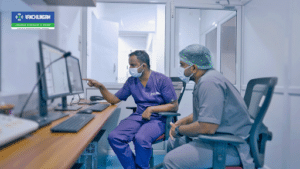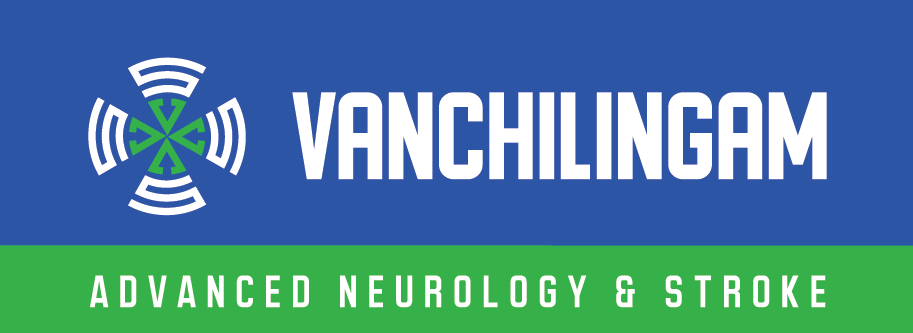Artificial intelligence (AI) has advanced significantly over the past few years in several industries, including healthcare. One of the most exciting areas of AI development is its application in stroke diagnosis and care. This blog will explore how AI is transforming the way we predict, diagnose, and treat strokes and how it’s set to revolutionize stroke care in the future.
How AI Can Predict Heart Attacks and Strokes
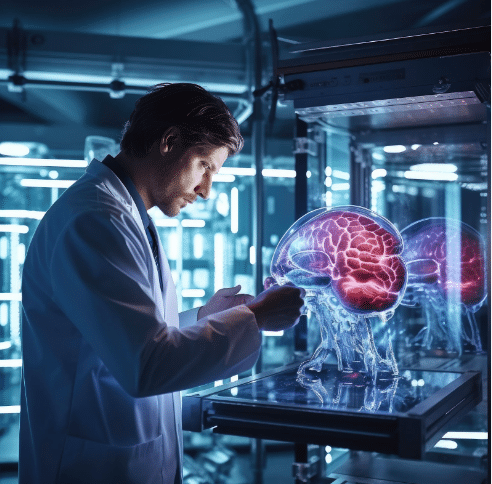
The Role of AI in Predictive Healthcare
Predictive healthcare is rapidly growing, and AI is at the forefront of this transformation. AI algorithms use vast amounts of data to identify patterns and make predictions about future health events. This predictive capability is particularly valuable for heart attacks and strokes.
AI can predict heart attacks and strokes by analyzing patient data, including medical history, lifestyle factors, and real-time health metrics. For instance, AI systems can process data from wearable devices, such as smartwatches, to monitor vital signs like blood pressure, heart rate, and even oxygen levels. By analyzing these metrics, AI can identify potential warning signs and alert healthcare providers to intervene before a stroke or heart attack occurs.
Stroke Prediction Using Artificial Intelligence
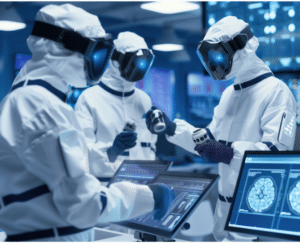
Stroke prediction using artificial intelligence involves using sophisticated algorithms to assess an individual’s stroke risk. These algorithms are trained on large datasets of patient information, including demographics, medical history, and imaging data.
Data Collection and Analysis

AI models analyze data from various sources, such as electronic health records (EHRs) and imaging studies like CT scans and MRIs. By integrating this information, AI can create a comprehensive profile of a patient’s risk factors and predict the likelihood of a stroke. For example, AI systems can evaluate patterns in brain imaging to detect early signs of Stroke or areas at risk of Stroke.
Risk Assessment Models
Advanced AI stroke prediction models use machine learning techniques to refine their risk assessments over time. These models continuously learn from new data, improving their accuracy and reliability. For example, AI can analyze the results of diagnostic tests alongside patient demographics to provide a more nuanced risk assessment.
Stroke Artificial Intelligence: Transforming Diagnosis and Care
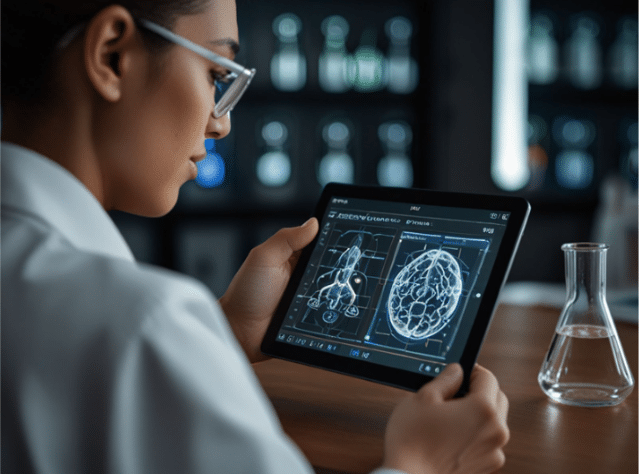
AI in Stroke Diagnosis
Stroke artificial intelligence is transforming the way strokes are diagnosed. Traditionally, diagnosing a stroke involves interpreting complex imaging data and clinical assessments, which can be time-consuming and prone to human error. AI streamlines this process by providing rapid, accurate interpretations of imaging studies.
Enhanced Imaging Analysis
AI algorithms can analyze brain scans with remarkable precision, such as CT and MRI images. For instance, AI can detect subtle changes in brain tissue that might indicate an impending stroke. These algorithms use deep learning techniques to recognize patterns in imaging data that might be missed by the human eye. This enhances the speed and accuracy of stroke diagnosis, allowing for timely and effective treatment.
Real-Time Decision Support
AI tools provide real-time decision support for healthcare professionals. During acute stroke situations, time is of the essence. AI-powered systems can quickly analyze imaging data and assist doctors in making critical decisions, such as determining the type of Stroke and the most appropriate treatment. The quick response has the potential to enhance patient outcomes greatly.
AI-Driven Stroke Care
Once a stroke has occurred, AI continues to play a vital role in patient care and rehabilitation. From personalized treatment plans to ongoing monitoring, AI is revolutionizing stroke care.
Personalized Treatment Plans
AI helps in developing personalized treatment plans based on individual patient data. For example, AI systems can analyze a patient’s response to various treatments and suggest the most effective therapies. This personalized approach ensures that patients receive the best possible care tailored to their specific needs.
Rehabilitation and Recovery
In stroke rehabilitation, AI-powered tools are used to assist patients in their recovery. For instance, robotic systems and virtual reality applications are employed to help patients regain motor function and cognitive abilities. These AI-driven rehabilitation tools provide targeted exercises and real-time feedback, enhancing the recovery process.
Statistics and Real-Time Data
Impact of AI on Stroke Outcomes
The integration of AI in stroke care has shown promising results. Studies have demonstrated that AI can improve stroke detection rates and reduce diagnostic errors. For example, a study published in the journal ResearchGate found that AI algorithms could detect acute ischemic Stroke with 90% accuracy, compared to 70% accuracy by traditional methods.
Future Prospects
Looking ahead, the potential for AI in stroke care is immense. Ongoing research and development will likely bring even more sophisticated tools and techniques for predicting, diagnosing, and treating strokes. As AI continues to evolve, it will play an increasingly important role in improving patient outcomes and advancing stroke care.
Conclusion
The AI revolution is making significant strides in the field of stroke diagnosis and care. From predicting heart attacks and strokes to providing real-time decision support and personalized treatment plans, AI is transforming how we approach stroke care. With ongoing advancements and research, the future of stroke diagnosis and treatment looks promising, offering hope for better outcomes and improved quality of life for patients.
By harnessing the power of AI, we are not only improving the accuracy of stroke predictions but also enhancing the overall care and recovery process. As we move forward, the integration of AI into stroke care will continue to be a critical factor in advancing medical science and improving patient health. Visit Vanchilingam Advanced Neurology and Stroke Hospital in Chennai for Stroke related problems since we are the best hospital for brain stroke treatment in Chennai.


